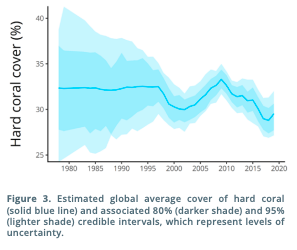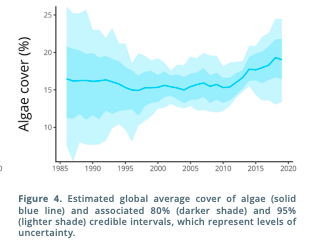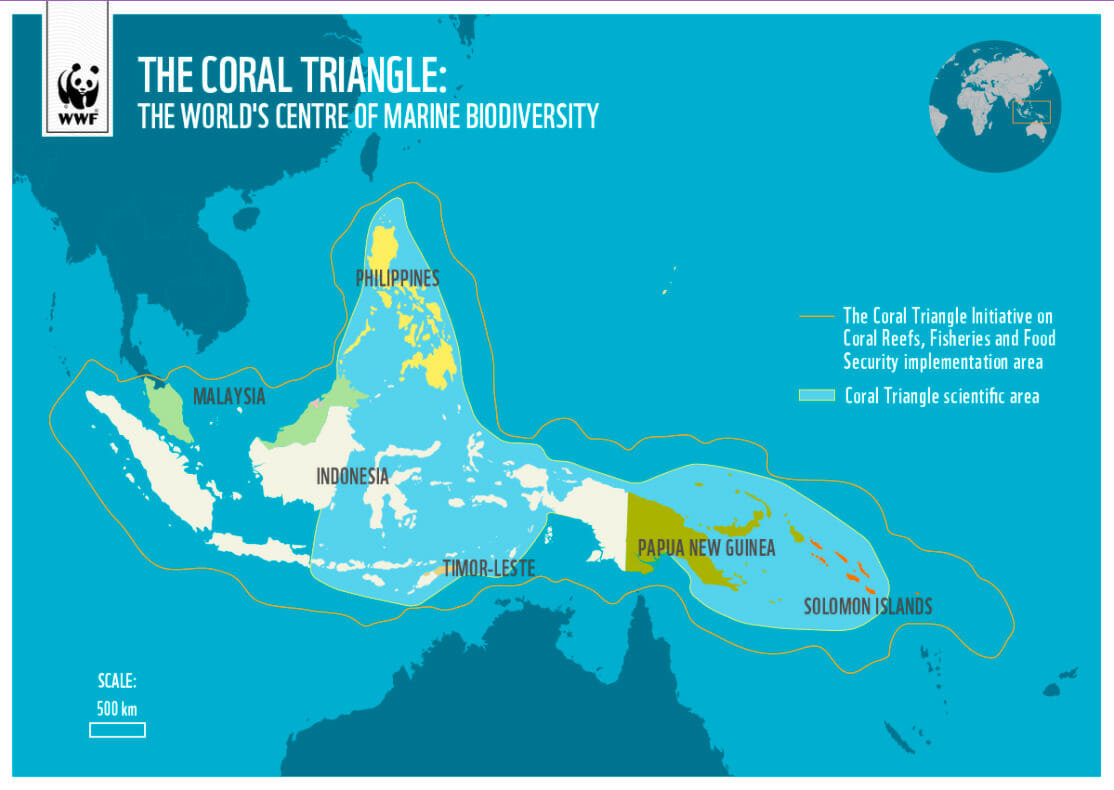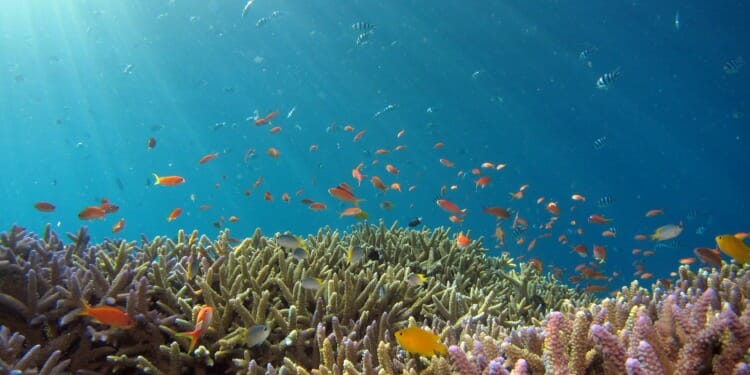The Global Coral Reef Monitoring Network (GCRMN) released the Sixth Status of Corals of the World: 2020 Report containing the largest analysis of coral reef health ever undertaken. It draws on data spanning across 12,000 sites in 73 countries for 40 years. The data has been collected by more than 300 scientists through two million individual observations.
Overall, they report the world has lost 14% of its corals from 2009 to 2018, which equates to around 11,700 square kilometers of coral – that is more than all the living coral in Australia. It finds that corals are under relentless stress in 2021.
The reasons for this are directly linked with global warming caused by climate change, which has been the greatest threat to coral survival. It has led to rising temperatures, and elevated sea surface temperatures which overtime induces large-scale coral bleaching.
When the water is too warm, corals will expel the algae – zooxanthellae – living in their tissues causing the coral to turn completely white. Here, the coral has not yet died, but is under increased stress and subject to mortality.
In 1998, there was the first global mass bleaching event which wiped out about 8% of living coral. The Intergovernmental Panel on Climate Change reported that 1.5 degrees Celsius of global warming could cause global coral reefs to decline by 70-90%, whilst a two degrees Celsius world would lose more than 99% of its corals. Global warming could lead to complete extinction of coral reefs if the problem is not taken seriously.
Other dangers threaten the survival of coral reefs: They are also vulnerable to ocean acidification, overfishing, destructive fishing practices, unsustainable coastal development, tropical storms, diseases, and declining water quality.
Although in 2010 the global coverage was back to pre-1998 levels, the report finds, this trend was quickly reversed with a global decline up until 2018. Two more global bleaching events in 2010, and between 2015 and 2017 caused this shift.

Why coral reefs matter: They support marine life and add to the economy
This is worrying. Although reefs cover only 0.2% of the ocean floor, they support at least 25% of marine species. The value of goods and services provided by coral reefs is estimated at $2.7 trillion per year, including $36 billion in coral reef tourism. They provide critical habitat for many fish, and a fundamental source of protein and life-saving medicines. Hundreds of millions of people around the world depend on coral for food, jobs, and protection from storms and erosion. Their extinction would not go unnoticed.
Interestingly, the report finds a positive correlation between hard coral cover and coral reef health. It further highlights that reef algae grows rapidly during periods of coral stress and has become an important signal for scientists. Over the past decade, reef algae have increased by 20%, which directly corresponds with declines in hard coral cover. This is problematic as it reduces the complex three-dimensional habitat that is essential to support high biodiversity and provide valuable goods and services for reef-dependent human communities.

East Asia’s Coral Triangle offers a gleam of hope

The GCRMN found that the coral reefs in East Asia’s Coral Triangle – which accounts for more than 30% – showed different trends than all other regions studied.
The cover of algae decreased overtime, resulting in an average five times more coral than algae on these reefs. The data provides hope that coral can adapt and grow a degree of natural resistance to warmer temperatures. More research needs to be undertaken in order to clearly understand why trends that pertain to this region differ.
Strategies to address coral loss
Although it is difficult to find optimism within this report, it is fair to say it could not have been published at a more important time. Not only has it been published ahead of COP26, but also, parties to the Convention on Biological Diversity are set to negotiate and adopt the terms of a new post-2020 global biodiversity framework, in May 2022, in the hope of putting biodiversity back on a path to recovery by 2050.
“Since 2009 we have lost more coral, worldwide, than all the living coral in Australia. We are running out of time: we can reverse losses, but we have to act now. At the upcoming climate conference in Glasgow and biodiversity conference in Kunming, decision makers have an opportunity to show leadership and save our reefs, but only if they are willing to take bold steps. We must not leave future generations to inherit a world without coral.”
– Inger Andersen, Executive Director of the UN Environment Programme
Scientists believe the revival of coral reefs depend on long-term cuts in emission and short-term innovations, the latter reposing mostly on coral reef restoration.
A greater number of projects globally have created Marine Parks over areas of coastal land and water, designated to protect natural resources and ecosystems. Marine Parks reduce human activity within these zones, helping the preservation of biodiversity and the restocking of fish and shellfish populations. Although it does not protect the coral reef from heat waves, it helps them sustain long-term health and strength.
Related Articles: COP15:The UN Biodiversity Conference Builds Hope for ‘Living in Harmony With Nature’ by 2050 | Healthy Oceans: The Cornerstone for A Sustainable Future
Another strategy, which involves greater active intervention has been the process of genetic engineering. Scientists have been identifying natural gene variants in existing coral that enhance their ability to withstand higher temperatures and diseases. They subsequently actively introduce these specific genes into the coral to make them more heat and disease resistant – in effect, creating a super-strain.
The most controversial strategy is Marine Cloud Brightening, as a geo engineering technique. In Australia, scientists believe they should brighten clouds – by spraying mist of seawater which encourages clouds to form and shields the ground from direct light – over a reef to shield them from extreme heat. This sort of technology would not reduce greenhouse gas emissions and could have further, still-to-be-determined ecological impacts.
Short-term innovation projects can, nonetheless, be controversial. Several climate activists believe the active intervention in coral ecosystems could be counterproductive and disconcerting. When humans turn a natural environment into a planned one it can become less biodiverse and less resilient to unexpected challenges like diseases.
The main culprit of coral loss is climate change, and thus, solutions should revolve around eradicating human induced climate change through the continued burning of fossil fuels. We should be wary of modifying the environment even more.
Editor’s Note: The opinions expressed here by Impakter.com columnists are their own, not those of Impakter.com. — In the Featured Photo: A school of fish in the ocean enjoying the coral reefs. Featured Photo Credit: Hiroko Yoshii.










